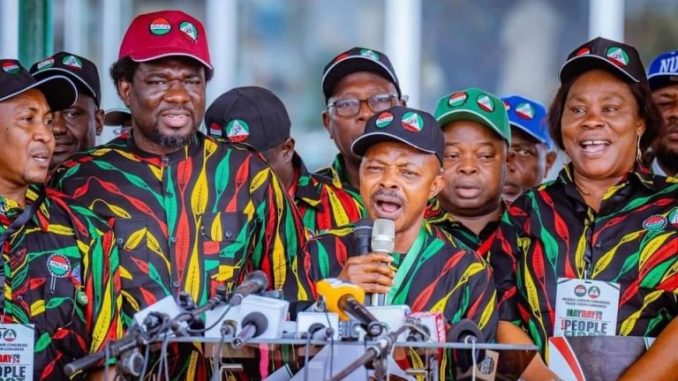As Nigeria celebrates Democracy Day, the Nigeria Labour Congress (NLC) maintains its demand for a new National Minimum Wage of N250,000.
The Acting President of NLC, Mr. Adewale Adeyanju, stated this in response to President Bola Tinubu’s Democracy Day speech in Abuja on Wednesday.
The Federal Government had proposed N62,000 as the new national minimum wage following a tripartite committee meeting with the Organised Private Sector (OPS).
Adeyanju acknowledged the President’s commitment to democratic principles that allowed the committee’s work to continue despite challenges.
“Our demand remains N250,000. We see no compelling reason to alter this figure, which we consider a significant concession by Nigerian workers during the negotiation process,” Adeyanju said.
He expressed surprise at the President’s claim of an agreement, clarifying that no such agreement existed with the NLC and TUC.
He emphasized the importance of rectifying this misunderstanding to avoid confusion in the ongoing wage discussions.
Adeyanju noted that the union had not seen the document submitted to the President and would reject any altered version.
He reaffirmed the union’s belief that the President, who currently holds the Tripartite Committee’s report, would prepare an Executive Bill reflecting the true demands of Nigerian workers.
“This is an opportunity for the President to demonstrate his commitment to Nigerian workers and the masses by rejecting advice from those who aim to harm the poor and struggling workers,” he stated.
Adeyanju alleged that union leaders faced intimidation and harassment from government operatives, possibly without the President’s knowledge.
“It is crucial for the President to understand that we were threatened during negotiations, with media propaganda and armed soldiers used to intimidate us,” he added.
The NLC remains confident in the President’s democratic credentials and urges him to favor the workers and masses of Nigeria.
Adeyanju also clarified that the NLC did not agree to a five-year duration for the minimum wage Act, despite the President mentioning it.
He suggested that inflation should be pegged at a specific level to determine the minimum wage, bringing clarity to the report.
“We reiterate that Nigerian workers cannot accept a minimum wage that leads to starvation.
We seek justice, equity, and fairness for all Nigerians, and we hope the President, who promised a Living Wage, will act accordingly.
This is an opportunity for him to show that he listens to Nigerians,” Adeyanju concluded.




